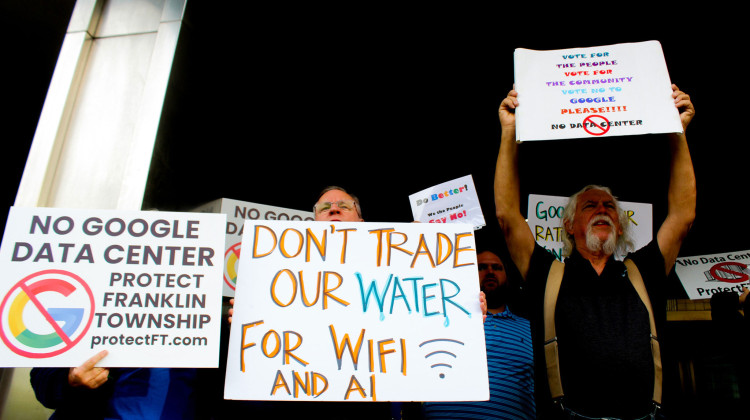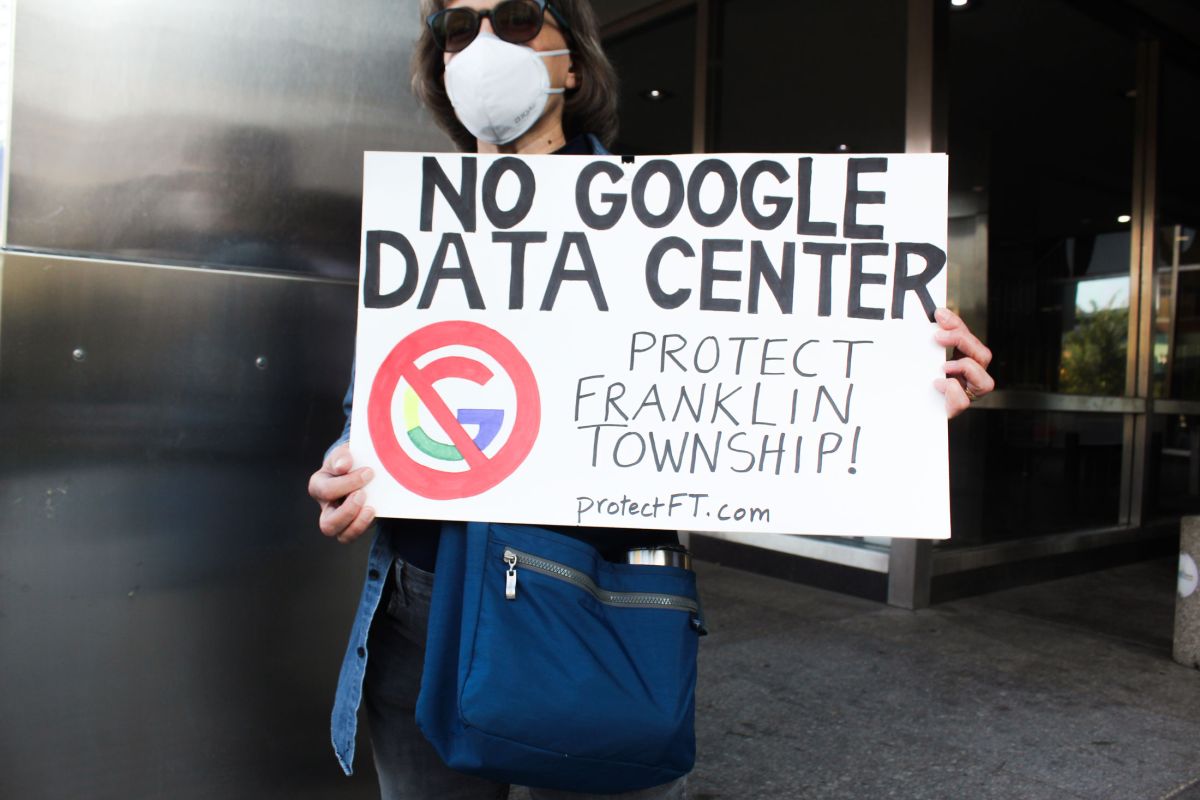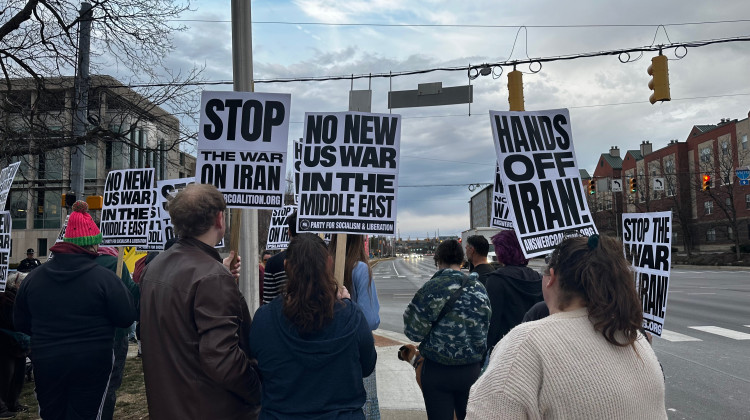
Protestors holding signs opposing Google’s proposed data center in Franklin Township cheer outside the Indianapolis City-County Building on Monday, Sept. 22, 2025. Just hours later, the tech company withdrew its rezoning proposal for the project.
Farrah Anderson / WFYIProtesting outside government meetings wasn’t always part of Meredith Sharp’s life.
The Franklin Township resident runs an herbal skincare business and lives just blocks from a proposed Google data center. — When she learned the global technology company want to build it on nearly 500 acres of land, she jumped in headfirst to stop it.
Soon, the mom of three was leading chants in downtown Indianapolis and rallying neighbors against the plan. Sharp had been looking for ways to get more involved in her community — but she never expected this.
Sharp and her neighbors formed a group called Protect Franklin Township. They launched petitions, ran targeted digital ads, and even bought billboards — all aimed at stopping Google’s project.
“All of us had so much skin in the game that we weren't really in a position where we felt like we had everything to lose, so why not just fight with everything we had?”
And it worked. Just a few months later, Google withdrew its rezoning proposal for the data center on the south side of Marion County.
Indiana is at the center of a data center boom, with billions of dollars in projects underway. Gov. Mike Braun has signaled the state would need more data centers if America is to remain the leader in artificial intelligence. Currently, no state agency is required to track the construction of centers. Citizens Action Coalition, which advocates for residents on energy and utility issues, reports nearly 30 data center projects are active across the state — and at least eleven have already been withdrawn, according to data from the advocacy organization.
“It’s really found traction in these communities, unlike anything that I've really seen,” Bryce Gustafson, an organizer with the group, said.
Across Indiana, residents from both political parties have rallied against the centers, citing concerns about new demands for electricity, increased use of municipal or groundwater sources, and a lack of transparency from developers.
And while it may seem daunting for small community groups to go up against a trillion-dollar company like Google, Gustafson said the fight has united neighbors and shown that local organizing can make a real impact.
“If I had $1 for every time somebody said it was a done deal, I could probably retire at this point,” he said. “But people need to hear that — that it is achievable, and it is feasible that this can be done.”
Republicans, Democrats find common ground against data centers
Alec Willis lives in Monrovia, a small, rural town in Morgan County, southwest of Indianapolis. A longtime Republican campaign volunteer, Willis said he was surprised to find himself leading a bipartisan movement.
When he first heard rumors about a data center coming to town, he wanted to know what it might mean for his community. Online, he found videos of residents near other data centers describing how water had become scarce in their neighborhoods. That research led to the creation of the Coalition to Protect Morgan County — a group made up of people who don’t always find themselves on the same side of an issue.
“There’s so many different ways you could be upset about this,” Willis said. “It doesn’t matter what walk of life you come from.”
Willis said many conservatives view data centers as conflicting with their values of limited government and corporate accountability. He worries that large technology companies like Google could wield outsized influence in small communities like Monrovia, home to about 2,300 people.
Across the state, organizers and advocates have raised similar concerns. Data centers use vast amounts of electricity and require millions of gallons of water to keep equipment cool. Those demands have prompted questions about who will pay for necessary grid upgrades — ratepayers or the companies — and whether large water withdrawals could affect local drinking water supplies.

While construction can bring temporary jobs, the facilities typically employ few long-term workers. And thanks to state tax incentives, companies can avoid paying sales taxes on much of their equipment.
“This is really just a nonpartisan issue,” said Gustafson, the organizer with the Citizens Action Coalition. “Everybody wants access to drinking water, everybody wants affordable utility bills. Everybody wants to feel like their voice matters in their community.”
Despite victories, residents brace themselves
After community organizers in Franklin Township claimed victory over Google — which withdrew its proposal to build the massive data center on Indianapolis’ south side — they say the fight isn’t over.
Google pulled its proposal before a final vote by the Indianapolis City-County Council to approve a rezoning request. But the company could resubmit another rezoning request within the next few months.
And while organizers across Indiana have looked to Protect Franklin Township’s victory for inspiration, Sharp said her group isn’t letting its guard down. Developers can always try again — and she’s worried the fight could start over.
For now, Sharp says, she’s proud — not just of what they accomplished, but of what it means for her community and the people watching her lead.
“I made myself an example for my children,” Sharp said. “For them to not have that feeling, ‘well, you quit when it’s hard.’ For them to see their mom keep fighting, cry about it — and then show up.”
Farrah Anderson is an investigative health reporter with WFYI and Side Effects Public Media. You can follow her on X at @farrahsoa or by email at fanderson@wfyi.org
 DONATE
DONATE








 Support WFYI. We can't do it without you.
Support WFYI. We can't do it without you.